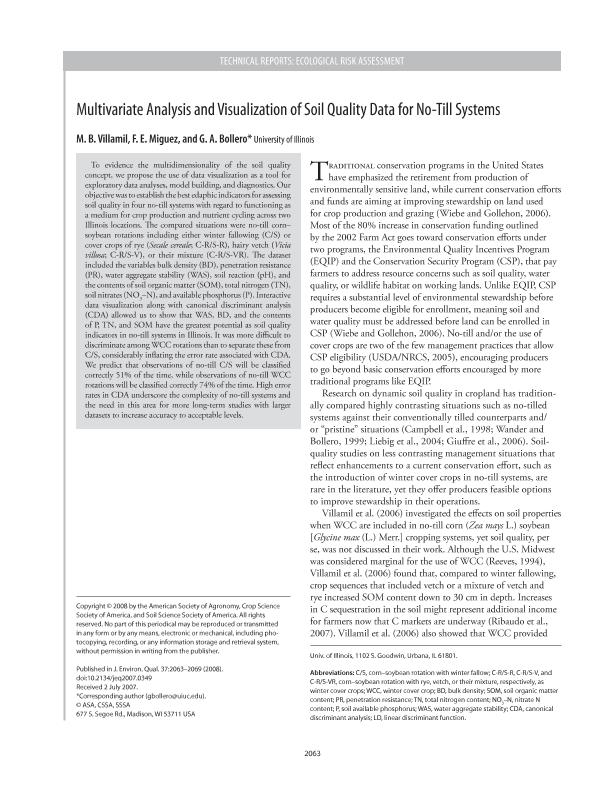Mostrar el registro sencillo del ítem
dc.contributor.author
Villamil, Maria Bonita

dc.contributor.author
Miguez, Fernando E.
dc.contributor.author
Bollero, German

dc.date.available
2019-05-02T15:08:11Z
dc.date.issued
2008-11-23
dc.identifier.citation
Villamil, Maria Bonita; Miguez, Fernando E.; Bollero, German; Multivariate analysis and visualization of soil quality data for no-till systems; American Society of Agronomy; Journal of Environmental Quality; 37; 6; 23-11-2008; 2063-2069
dc.identifier.issn
0047-2425
dc.identifier.uri
http://hdl.handle.net/11336/75389
dc.description.abstract
To evidence the multidimensionality of the soil quality concept, we propose the use of data visualization as a tool for exploratory data analyses, model building, and diagnostics. Our objective was to establish the best edaphic indicators for assessing soil quality in four no-till systems with regard to functioning as a medium for crop production and nutrient cycling across two Illinois locations. The compared situations were no-till corn-soybean rotations including either winter fallowing (C/S) or cover crops of rye (Secale cereale; C-R/S-R), hairy vetch (Vicia villosa; C-R/S-V), or their mixture (C-R/S-VR). The dataset included the variables bulk density (BD), penetration resistance (PR), water aggregate stability (WAS), soil reaction (pH), and the contents of soil organic matter (SOM), total nitrogen (TN), soil nitrates (NO 3 -N), and available phosphorus (P). Interactive data visualization along with canonical discriminant analysis (CDA) allowed us to show that WAS, BD, and the contents of P, TN, and SOM have the greatest potential as soil quality indicators in no-till systems in Illinois. It was more difficult to discriminate among WCC rotations than to separate these from C/S, considerably inflating the error rate associated with CDA. We predict that observations of no-till C/S will be classified correctly 51% of the time, while observations of no-till WCC rotations will be classified correctly 74% of the time. High error rates in CDA underscore the complexity of no-till systems and the need in this area for more long-term studies with larger datasets to increase accuracy to acceptable levels.
dc.format
application/pdf
dc.language.iso
eng
dc.publisher
American Society of Agronomy

dc.rights
info:eu-repo/semantics/openAccess
dc.rights.uri
https://creativecommons.org/licenses/by-nc-sa/2.5/ar/
dc.subject.classification
Agricultura

dc.subject.classification
Agricultura, Silvicultura y Pesca

dc.subject.classification
CIENCIAS AGRÍCOLAS

dc.title
Multivariate analysis and visualization of soil quality data for no-till systems
dc.type
info:eu-repo/semantics/article
dc.type
info:ar-repo/semantics/artículo
dc.type
info:eu-repo/semantics/publishedVersion
dc.date.updated
2019-03-27T13:31:58Z
dc.identifier.eissn
1537-2537
dc.journal.volume
37
dc.journal.number
6
dc.journal.pagination
2063-2069
dc.journal.pais
Estados Unidos

dc.journal.ciudad
Wisconsin
dc.description.fil
Fil: Villamil, Maria Bonita. Consejo Nacional de Investigaciones Científicas y Técnicas. Centro Científico Tecnológico Conicet - Bahía Blanca; Argentina. University of Illinois; Estados Unidos
dc.description.fil
Fil: Miguez, Fernando E.. University of Illinois; Estados Unidos
dc.description.fil
Fil: Bollero, German. University of Illinois; Estados Unidos
dc.journal.title
Journal of Environmental Quality

dc.relation.alternativeid
info:eu-repo/semantics/altIdentifier/doi/http://dx.doi.org/10.2134/jeq2007.0349
dc.relation.alternativeid
info:eu-repo/semantics/altIdentifier/url/https://dl.sciencesocieties.org/publications/jeq/abstracts/37/6/2063
Archivos asociados
